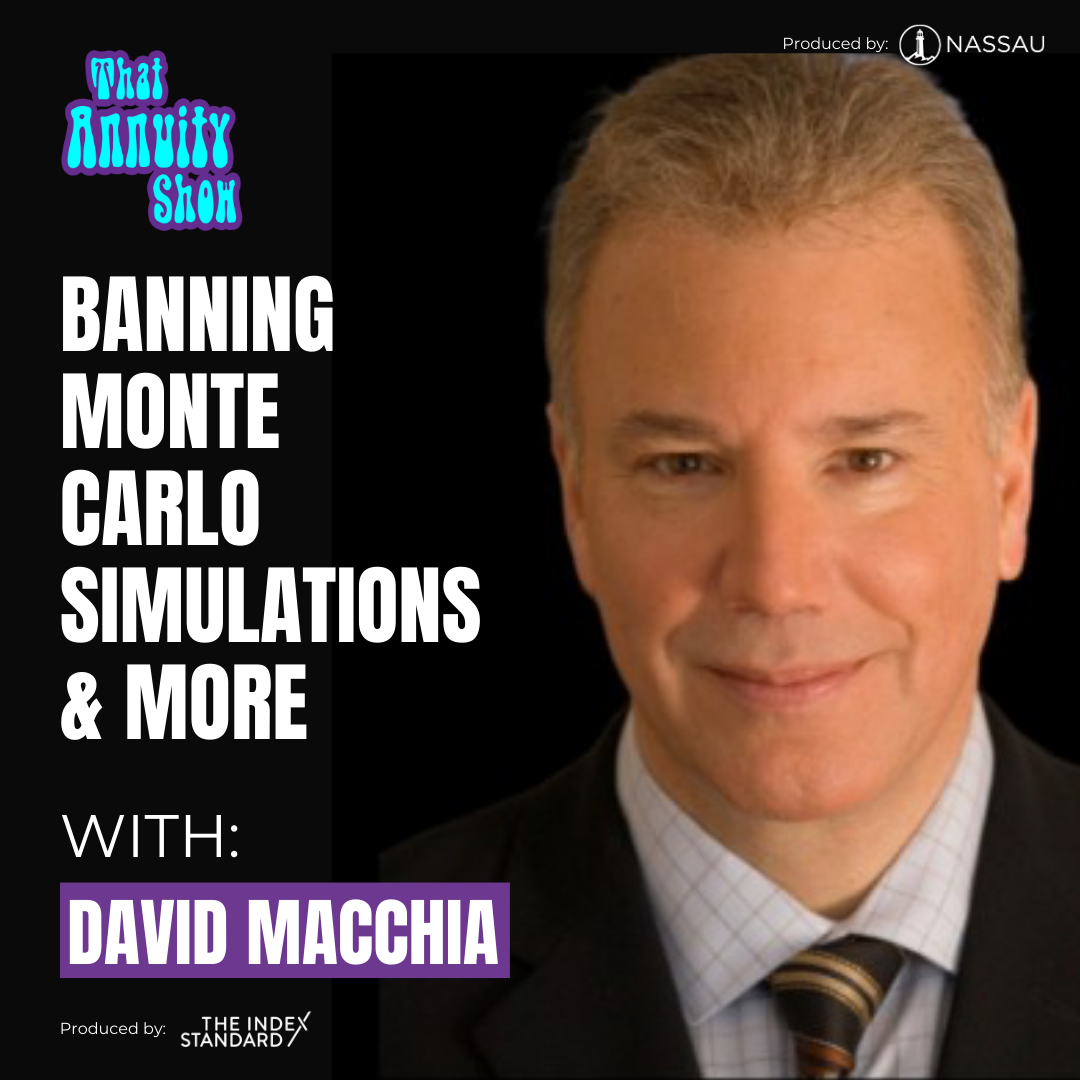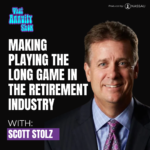BDo Monte Carlo simulations cause more harm than good? David Macchia, Retirement Income Strategist, Entrepreneur, and Founder of Wealth2k explores this topic and more today. We cover the politics of pay, why “sales” seems like a dirty word, and our upcoming Retiretech 2.0 conference in NYC.
Do Monte Carlo simulations cause more harm than good? David Macchia, Retirement Income Strategist, Entrepreneur, and Founder of Wealth2k explores this topic and more today. We cover the politics of pay, why “sales” seems like a dirty word, and our upcoming Retiretech 2.0 conference in NYC.
Links mentioned:
https://www.linkedin.com/in/macchia/
https://imagine.nfg.com/retiretech-forum-2-0/
Listen
Watch
Receive Updates
Show Sponsors
Episode Transcript
The discussion is not meant to provide any legal, tax, or investment advice with respect to the purchase of an insurance product. A comprehensive evaluation of a consumer’s needs and financial situation should always occur in order to help determine if an insurance product may be appropriate for each unique situation.
paul_tyler:
Hi, this is Paul Tyler and welcome to another episode of that annuity show. Bruno. Good to see you.
bruno_caron:
Good to see you. Good afternoon, and very always always in a good mood when we talk to David. So looking forward to this
paul_tyler:
Yeah, good. all right, Ramsey. good
ramsey_d_smith:
All
paul_tyler:
to see
ramsey_d_smith:
right,
paul_tyler:
you on a
ramsey_d_smith:
good
paul_tyler:
Friday.
ramsey_d_smith:
to be here on on on a Friday here from Atlanta. Delighted to welcome back to our program. David, Marcia, David Is, has done lots of different things in our In our space Primarily would like to be described to somebody who’s I’m paraphrasing, been steadfastly dedicated to financial literacy and in Lusion, and along the way has done so defending the benefits of annuities, And we’re going to be talking about some, some, really, some, critical, some critical ways that he thinks we should be thinking about both annuities, and also importantly, thinking about some of the analytical tools that that underlie some of the advice that’s given these days, So with that I’ll turn it over. Turn it over to actually turn over to you, Bruno To start off the conversation.
bruno_caron:
Well, thank you, Ramsey, and as we said, very very happy to always continued the conversation with with David and David. Why don’t we start off with with a recent? A few recent articles that were were published in Advisor Perspective. That was all related to H to Monte Carlo simulation. We all know that it is a tool that is being used by by advisers and planners, and Sometimes that tool is being used counter the benefit of potentially using annuities and financial planning. You’ve been a very very deep voice on on income retirement income through through your flame framework of the constraint investor. What are your thoughts on the the status today of money car Simulations?
david:
Well, great question, and so good to be here with you guys. Become such a devotee of this show. You have done such a wonderful job with it, and privileged and honored to be part of it again today. thank you for having me back. So Bruno when that article was published by Advisor Perspectives, January ninth, I believe, written by Weight Fou and Massimo Young. it was a monumental occurrence that did not in my judgment, get as much attention as it should have. I think every financial advisor in the United States should read that article, whether you are a anuityfan or not. It’s so very important, because what it showed in a way that’s inauguable is that Marny Callow is anything but scientific. It’s variable, it’s arbitrary. It’s contingent upon the capital markets assumptions that an advisor or firm users and foul and young. Even I thought this Fascinating. They went to forty investment firms, including some of the largest in the United States. Mere Goldman sacks, J. P. Morgan and others, and they brought the case of an individual and said, What would your money college simulation tell this person? And the range of outcomes among those forty firms was remarkable from a sixty two percent confidence rate to a ninety five percent confidence rate. What is a Dividual? What is a consumer to think of that? And you know, the assumptions that they showed, maybe like on equities, ranged from five percent to ten per cent on bonds. The range was incredible.
ramsey_d_smith:
The return assumption, You mean?
david:
the return assumptions,
ramsey_d_smith:
Yeah,
david:
so there’s absolutely no scientific a notion about it And here’s here’s my problem with it. I’ve always thought and I’ve written about this multiple times that it was an inappropriate tool to use with constrain investors, because Constraint investors, by definition, must have protection against longevity risk, and they must have protection against time and risk, And Marni Carlo does not make room for That Doesn’t make room for what. for those people is the most important issue in planning their income. But what thou and young did was showed that it’s It’s inapplicability is way broader than I had thought about it. It really is inapplicable to logically kind of everybody. And my problem is that it gets used as a proxy for safety. You have a false set of confidence that comes out of it, Because you say retire, You have a ninety five percent chance that this is going to work out perfectly, but it could be a sixty per cent chance or a seventy percent chance, or a fifty nine percent chance, or an eighty eight percent chance based upon those assumptions that are selected, and that’s just way too risky for most people for most people, Retirement. And so I think it should not be used in the context of retirement income with certainly most people, if not all. And that’s why I wrote that article, and again, I think foul and young. That article needs to be read by everybody. It was such an important development.
bruno_caron:
It’s a good point, and I think that risky is one thing, and you know the fear within within investments, and all of those risks that retires actually face are absolutely true. But do you also see an angle where either using annuities or using other types of lifetime vehicle can not only reduce Risk or protect, but also leverage and help retires. being a position of strength, in other words, not just playing, not just used annuities to play defense, but use annuities to play offense
david:
A great point, and I think annuities reduce risk and enhance risk of exposure. And what I mean by that is if you are a retire who has a plan that incorporates annuities in the right way, you get a couple of things that come out of that. you, first of all, every month through retirement, you havei a guaranteed pay check. Secondly, you have long term protection against longevity risk. If you have those two comforting factors in your plan, And and then you have exposure to equities, which you should have, But the market goes bad. It gets really volatile. It’s generating big losses in a strategy that doesn’t have those protection dynamics. People are going to run away from it most likely, But if you have that security, if the advisor can get on the phone, you know Bruno. I know you’re nervous. Everybody’s nervous. but listen, your paycheck is secure. Don’t worry about it. Write this Out. and there, the annuity becomes the empowering factor for being able to stay exposed to risk. Does that make sense?
ramsey_d_smith:
I think you’re
bruno_caron:
Absolutely
ramsey_d_smith:
muted.
bruno_caron:
Absolutely, And I think that’s a. It’s a very powerful message that things need to be looked at on an aggregate basis, and I think
david:
Well,
bruno_caron:
we all agree.
david:
it goes to the notion that the secret of retirement income is not one thing you know. we tend to. We tend to you know. again, Go into these silos and the investment people think that they’re the answer for everything, insurance people. they think that they’re the answer for everything. In the reality is that we’re both the answer. We have to by definition be both.
ramsey_d_smith:
Yeah, that’s that’s the truth and it’s unfortunate that that a combination of a combination of things sort of contribute to that one is cultural and philosophical. Between those two parties. Another one is the way to those two parties has compensated right and there isn’t you know. There hasn’t been sort of an easy way to sort of melt. The two things melted two things together. We’ve talked a lot about this on this show about different ways you can resolve that Flat fees. Ourleafees. What have you? But it is it isn’t it is an, it is, an ongoing is an ongoing challenge. And you know, as we talked about before the show, I mean Marti Carlo Monticarlo, I think look, I think it’s useful. Certainly it under penned a lot of the work I used to do in my old, my old profession, but the key thing is that it shouldn’t be used as an absolute answer. It should be the start of a conversation, and to your point, the drama To the differentials in in in assumptions, Uh, you don’t make all the difference. All the difference in the world. It’s really, and it’s really going to be very hard for you, typical consumer to be able to decipher that Like which which advisor
david:
Yeah,
ramsey_d_smith:
has got the right set of assumptions Versus which one doesn’t
david:
Yeah,
ramsey_d_smith:
They don’t have the
paul_tyler:
Yeah,
ramsey_d_smith:
tools to do that.
david:
I can’t.
paul_tyler:
well, I would. also you. just sort of take another angle. Then another vector criticism is. Does the presentation of the data create a false impression of the results? I mean David. In your paper, you kind of hit on that is that man, the capital. You know, some of the capital market assumptions have wild impacts on this. you know, I saw one annuity Where some people have done some back casting on a particular set of returns with one index strategy was interesting. You. Ow. you, look at it. It was if you kind of looked and said, Okay, what are the odds that this thing is not going to result? Return great results. you know, Fifteen, twenty years out, I look like it was a flip a coin. So of chances, Now when you really dig into those dots at the bottom, what do they all have in common? Well, they were all markets in which you had Steep declines in the last couple of years of retirement, and just sort of wiped out your retirement. So Ou know, if I had just looked at a sort of normal distribution results, I would have said well, probably could work out, but it really didn’t tell me that I’ve got mammoth amount of risk in this particular strategy. If like god forbid, I get close to retirement and the market does what it just did,
david:
That’s an excellent point and you resonates with me for a couple of reasons. Paul. One big reason is that when I started in the retirement income business, I had a bucketing strategy. Six buckets, you know, and the buckets. I’m absolutely convinced From observation help people behave better, you know, especially the early years of retirement. But there is that risk that what happens when I’m eighty three and I’m close to the end there and I have a big down turn of the market, And that’s why we added flooring into the strategy. That’s why we add the lifetime Income element years ago to create a hybrid. because just for that very reason, you need to have that downside protection, at least a minimum amount of guaranteed income to cover your essential expensive. Your point is, Your point is an important one. in my judgment.
bruno_caron:
So going back to the you know the Man Card simulation in parallel to that, Having Carlo simulation type tool implies that you have a systematic withdrawal plan. If you have a systematic withdrawal plan, can you discuss some of the dynamics that are going on in terms of withdrawal versus versus return? So in, in an upward return, You’re selling more or less of securities to get the same pay check or same same same withdrawal, and vice versa markets go down. What happens and what is the philosophy behind that In terms of
david:
M.
bruno_caron:
in terms of executing on your systematic withdrawal plan,
david:
Ah, so the way an advisor said it to me once was the best I ever heard. I wish I had thought of it, he said, The problem of systematic withdrawal plants, as they force you to make poor investment decisions, classically poor investment decision. So what do you mean? he said, Well, think about it. The markets going up up up up up. What would you want to do as an investor? A smart investor would want to sell them and take profits, lock in profits. But the systematic whdrawupplan forces you to sell less when the market is going up, and when the market is nose diving. What? What a smart investor do? Well, That’s when you hold on, you know to to those positions regain you know their value and you could sell them at that time. but the systematic with Dora plan advises you to do the opposite when when stocks on nose di, think it says, sell more some more, And that’s when you get into. obviously the downward spiral that if it happens early in retirement, can cause people to run out of money and have those two dreaded words. The academics, a portfolio ruin, Right means in your dead, broke in retirement. So you know The other thing is, and I get criticized on line for this by by a noted academic. Um. I said, I quoted another advisor. You know the idea they come back with. You know remedy for this as well. We have a dynamic which roll scheme. When the market is going down, you know you’re going to cut back your income right, And the advisors had a beautiful quote and basically said, You know that’s something that works in the academic world Right in a spread sheet. But when you’re sitting down at the kitchen table with a real client and you tell them that they need to take a thirty five percent pay cut this year that doesn’t go, that doesn’t work. And you know if you’re a constrained investor, go back to that type of investor again. you know. for me, the systematical drug plan should be forbidden, because those people may have enough money to retire. They don’t have any money to make a mistake.
bruno_caron:
That’s It’s a good way to put it, and that’s when the conversations on. Well, if the plan doesn’t work, I still need money now, for you know, for basic needs for necessities or for trips, Because I mean do that trip later on. I may be injured later on, I may be impaired. I may be dead. and the flip side to that is you may not. So that’s that. That’s definitely definitely a consideration that the practical world is not always in line with with the theory. So what do you? What do you? How do you? How do you gage at? How do you calculate that? How do you? How do you see if you’re if you have enough. If you’re a constraint investor? What are some of the some of the guide lines that that you have that you can recommend to people to bench mark themselves in terms of Sets an income.
david:
Yeah, well, in building a plan, I think most advisers who are working with Constrained invests would try to determine how much of the total acid base has to be devoted to safe income sources. Social security obviously would be one. If there’s a pension there, Lucky an annuity to supplement that. What would it cost to create enough a safe income to match against their essential expenses? And then what’s left over? And what kind of plan can you eat? And you know it’s not unusual where the clients, um, conception of retirement is really, or kill with reality where they think that they’re going to have a ex amount of dollars, you know of income and they’re not able to really get that, And I give you a real world example from about two months ago I was introduced to these people in Colorado, and she’s seventy two and he’s seventy three, and they have lost. They had about two point one million dollars, and before these corrections in recent months, then they lost about three hundred and ninety thousand dollars, and they were told by the financial advisor that he was going to put them in quote, Unquote Warren Buffets portfolio, whatever
bruno_caron:
Oh,
david:
that means, And you know now they’ve lost about four hundred thousand dollars And there are life style is too expensive For what their portfolio can yield, and so became a conversation. Where can we cut back? Do I need the third car? You know, Can I cut this back? Can I cut that back? And these are difficult conversations that advisors have with folks all the time, and you have to go through that process with someone who’s really constrained to get to something that can work for them and create a aminimally acceptable lifestyle.
ramsey_d_smith:
See you’re on mute, Paul,
paul_tyler:
So I’ll open this door carefully.
ramsey_d_smith:
M,
david:
Oh
ramsey_d_smith:
M.
paul_tyler:
So is the government actually in policy makers? They finally seen the value of annuities, Now evidence secure Act to Dot, secure Act, secure Act, Dot. I can’t believe the government is actually making matching contributions.
david:
H.
paul_tyler:
Now you know,
david:
M.
paul_tyler:
for one case, or savings vehicles in first people of certain income levels, I think they’ve made it more friendly to Annuities inside for an K. plans. Is this? Are we finally starting to take annuities a little out of a political discussion more, and moving it into a one of policy?
david:
Well, policy is political, so first of all, isn’t it a wonderful development that these things are happening right and it isn’t in the national interest that these things are happening. I believe it is. I believe it is. M. It’s a healthy trend and I think it’s probably going to continue because the social compact is strengthened by more annuity, annuitized, income or guaranteed income. There’s no question about that, but I’d like to if I can’t ask you guys a question. Tho, because when you talk about politics, I go back to Ramsey’s comment earlier about compensation right, There’s a lot of fights that are compensation based. Would you agree with me that All advisers have to be paid for their work and we have a big enough space where we can accommodate multiple payment schemes and multiple practice models. The bigger issue for me is let’s do the right job for retires. Let’s not exclude solutions based upon a payment model. Let’s acknowledge, Okay, I get paid the way I get paid, but I’m going to do the right thing. You know, to me, That would be taking the politics out of the annuity conversation, as opposed to fighting about the annuity and the payment schemes. I don’t know. What do you guys think about that?
ramsey_d_smith:
So let’s go one question at a time. So the first one was the first one was that every the advisors should be paid. And so if if I use the term advisors very generically to
david:
Yeah,
ramsey_d_smith:
include fiduciary advisors, to include insurance agents, to include right with a small, A,
david:
Yeah,
ramsey_d_smith:
Um, Yes, absolutely, I think that there should be compensation there. And and as much as people say that certain certain types of advisors and agents don’t Don’t don’t always add value. If that were the case, then there wouldn’t be so many questions from clients and long conversations to get to
david:
Yeah,
ramsey_d_smith:
right to get to a conclusion of a sale. So
david:
Good
ramsey_d_smith:
yes,
david:
point
ramsey_d_smith:
for sure, there should be compensation. And then the second piece was. Um. Was that, having accepted that that we should be able to focus on retires first? Absolutely so, yes and yes, Bruno. you’re up. We lost Paul temporarily. So you’re up,
bruno_caron:
On the compensation issue, I mean, it’s a broader question, I mean, should should construction worker get paid? Should doctors get paid? Of course, I mean that’s that’s That’s how we’re constructed as as a society. and as you, you both alluded to. It’s a complex world. It’s it’s a complex environment. So you need that knowledge you need. you need. you need that that connection between the consumer and you know this, this this complex Environment. So there’s there’s no doubt there that that’s That’s just stating the obvious. And so you know, the question is how, and of course I think that anyone with the right sense is. Uh, cannot argue that you know annuities should be ignored for everyone. I mean that that’s just a complete nonsense. If you’re you’re looking at it from a pure Academic standpoint. Some you price future cash loads to certain reality at the end of the day. Are you going to accomplish your goes through through some guarantees through some insurance contracts or through some investment? I think we all agree that the answer is a little bit of both, and I think that those those things should be should be looked anintendem. And and that’s just a simple reality, that that that that can help retires do the right things accomplish their their goals of simply living a life that that they want and deserve.
david:
Makes sense.
ramsey_d_smith:
Paul. it’s your turn. You were off for a second. The question was are can agents? should agents and advisors be compensated for their work? And if we can agree that they’re more than more than one way to accomplish that fairly, should we be able to focus on retires?
paul_tyler:
I would think so now as risk what I guess or question mark. What will? what will the dol come out with later this year? They’ve already told us that they’re coming out with another fiduciary rule and David. I think this will have a major impact on retire plan Now, Maybe it’s the compensation mount model. Maybe it’s the disclosure. Not sure you may have
david:
Yeah,
paul_tyler:
more better information than I have.
david:
I don’t I know. I know it’s being challenged or will be challenged more. I don’t know. but let me let me throw one more question out. I think we should dlink two words. This really annoys me when when advisors say I don’t sell annuities, sell annuities sell being a pajoritif. By definition, right, in my perspective is everybody sells. The whole economy is based on selling right. lawyers sell doctors, so investment advisors sell their services. They persuade clients that they’re a better investment adviser than another investment advisor. It’s not a dirty word. Do you agree that sell is not a dirty word
bruno_caron:
I agree.
ramsey_d_smith:
All right, I, well, I fundamentally agree that I agree that everybody sells sell is not a dirty word. What it does do, is it? I think it clarifies that, irrespective of your of your job, whether you took the hypocratic oath or your, you know, a c, f, P, or you’re an agent, or whatever, whatever you happen to do right, you ultimately end up having to sell your services. It’s Very clear in the medical profession whether it’s farmer suticals, or it’s cosmetic surgery, or you know all other sorts of sort of alternative, alternative forms of medicine that you know that are optional that are nice to have the not need to have that that are sold very aggressively by by by the medical profession. It’s everywhere. it’s everywhere. So so my point of view is maybe I come across a ittle bit more cynical. I just sort of accept that it’s normal in every part of our lives Doesn’t make me love. Word sell,
bruno_caron:
M,
ramsey_d_smith:
But I just accepted
bruno_caron:
hm,
paul_tyler:
Well,
ramsey_d_smith:
that
paul_tyler:
you
ramsey_d_smith:
it’s
paul_tyler:
know I agree, David. we’re selling all the time. Somehow you know, semantics have gotten to the point where selling has A has been linked to manipulation or aggressive persuasion. Because you noticed nobody has have yet seen anybody in the last five years, Get promoted to be head of sales and a company that are all Chief Revenue
david:
Distribution?
paul_tyler:
officer, Chief
bruno_caron:
M,
paul_tyler:
growth
bruno_caron:
hm,
paul_tyler:
Growth officer. Right,
bruno_caron:
That’s a good point.
paul_tyler:
Right,
david:
Yep,
paul_tyler:
it is.
ramsey_d_smith:
I never thought of that.
paul_tyler:
I don’t. Yeah,
bruno_caron:
Yeah,
paul_tyler:
it’s yeah. Seriously, look at linked in. See if you can find somebody. be able to point it at head of sales. They’re not today Across the industry Now is a good thing. Well, I think if it shifts people away from well, how big was that annuity sale? What did you sell generate in deposits? I think if we shifted more towards asking ourselves, how many Retirement plans did we deliver this year? How many clients did we did we serve, Um. Michelle Rector’s point, I think would be how much retirement income David did you create this year
david:
Right.
paul_tyler:
For people
david:
that’s a great way of saying it.
paul_tyler:
get focused
david:
Yep.
paul_tyler:
on purpose, But I agree with you. We’re all in the. You know, we’re all shaping impressions of ourselves, Ramsey, the services we provide And Just because I get paid one way, David doesn’t mean it’s bad. and just because I meant I’m getting paid this way doesn’t mean I’m good.
david:
Yeah, I think if we can take the politics out of the equation, then the judgment doesn’t be The judgment over how I get paid. the judgment over. You know, the words sell, it doesn’t become insulting. and that’s what I would hope to have happen that we can extract the political disagreements over annuities and focus on focus on securing people’s financial security and retirement.
ramsey_d_smith:
All right, So David. that’s that was. That was one of one of many topics that you you were active discussing on Linked in and published. On. What? What other things are top of mind for you these days?
david:
There’s such of three areas, Ramsey that that I write about one is obviously what we’ve talked about. Another one is Maco economics. And then I just had an article published about how people can use these new kind of applications that have been created to build their own videos. Because you know people love video. Everybody knows that it’s so much more engaging. It’s so much more interactive And there’s these applications that have come out that make it easy for you have. No, You don’t have to be a designer in any way shape perform. but you know in an hour or two you can have a beautiful video that gets your message across and my advice to the advisors was you know, Investigate these things, write a script, write a script, that is, think of how you would speak to a real client and make it that way, crate a script. Record it. I showed them where they could get on application. That makes it easy to record and put a video together and start getting it on you Website and get it into your email marketing and your social media marketing, and join the video revolution. You know, in our business, financial advisory business is too little used in my view, and it’s just now too easy to avoid. So that’s what. That’s my most recent topic.
ramsey_d_smith:
All right, What are the platforms that you like for that?
david:
Oh, there’s There’s an application called Beyond V, I n d. There’s animaker A n I, m a r H. dudelydoodl. You’ve seen these animated videos everywhere. That kind of like these
ramsey_d_smith:
Yep,
david:
cartoon characters move around to do that. It’s like super easy, super super super easy That you can. If you want to you know, create a valentine for your wife. You can. you can do it in video in fifteen minutes.
ramsey_d_smith:
Now
paul_tyler:
Okay,
ramsey_d_smith:
I know
paul_tyler:
I got
ramsey_d_smith:
for next year.
bruno_caron:
Uh,
david:
Yeah,
paul_tyler:
okay. I’ve got. I’ve got to ask you
bruno_caron:
huh.
paul_tyler:
if you tried chat. g. P. T yet.
david:
I did. I did and guess what I has to you know, could you define a constrain investor and it gave me a pretty pretty good answer. Pretty accurate answer. So yeah, I have, and that’s fascinating, Paul. I mean, I got a hundred million users faster than anything ever.
paul_tyler:
Oh, it is. I said. please write me. I don’t have to use the word please. I don’t Ramsey. Do I have to say please to a machine? Write an eight hundred word essay on why people should defer taking social security until they have to. With citations,
david:
Really
paul_tyler:
David. It did. I send it to our compliance
david:
Wow,
paul_tyler:
person, and he looked
ramsey_d_smith:
Did
paul_tyler:
at
ramsey_d_smith:
it
paul_tyler:
and
ramsey_d_smith:
pass?
paul_tyler:
he started to actually argue with the context of this thing. Like some, A couple of assumptions they made.
david:
Okay,
bruno_caron:
What was the conclusion?
paul_tyler:
Oh, it was better to wait. They gave. It was a great say, Bruno. on this, I’ll send a copy to you. It was good.
david:
It. also, it also will give you some goofy answers And I read an article Coincidentally about this yesterday people were asking a question like if you could, if you could avoid the halo cost at the cost of insulting one person with Rachel Episode. What is the right answer? And the answer that came back was Well, you should always avoid the Rachel epithode.
ramsey_d_smith:
That’s
paul_tyler:
Oh
ramsey_d_smith:
It’s a strange question. yeah,
bruno_caron:
That’s
paul_tyler:
very
david:
That
bruno_caron:
it?
ramsey_d_smith:
yeah,
paul_tyler:
odd.
david:
that that kind
ramsey_d_smith:
yeah,
david:
of crazy craziness,
ramsey_d_smith:
yeah.
david:
Uh
paul_tyler:
Yeah, doesn’t compute
david:
people people people don’t take doesn’t take people long to find bizarre ways to test systems.
ramsey_d_smith:
Well, and it’s and it’s still. It’s still. It’s still early days right. So a hundred million users are essentially a hundred million trainers, Right
david:
Yeah,
ramsey_d_smith:
And
david:
it’s it.
ramsey_d_smith:
I don’t think there’s any question that it will get better. I think that the adoption the doption piece is what’s most telling. Like people are people are comfortable interacting with it Like that’s that means that more and more people are going to continue training it. So it’ll just be a question of whether or not you know it has enough computing capacity and it kind of content, Sort of things, and also like how much actual curation is need, because I think there is some curation behind the scenes that
david:
Yes,
ramsey_d_smith:
goes on. but fundamentally, though I mean there’s it’s like anything. It’s like Crypto. I, On’t. now exactly know what the future is going to look like, but it’ll be part of it. you know.
david:
Do you guys think that it will You think This is the thing that could alter Google’s dominance?
paul_tyler:
Absolutely
ramsey_d_smith:
Uh, potentially,
david:
You do.
ramsey_d_smith:
Yeah,
paul_tyler:
Absolutely. but I think what it will change and how you approach building websites, Um achieving Sco. I don’t know. I’m sure Google has to rewrite its Alcarim, David, like you, and I could probably create a thousand page website on one particular subject of financial planning or retirement planning kind of own. Every single word in there is Google really going to put Sup it like the you know on the first page. I don’t know.
ramsey_d_smith:
But here’s the thing. though, like if where before, Google would bring a set of choices. You know, according to some hierarchy, either you’ve paid or you know your your Co ranking as higher. But now something just gives you the answer, So there’s no click through right. There’s no click through to some to somebody’s sort of commercial website. It’s the answers right there, so I mean at the end of the day like Google is part information part, It’s It’s important source of information, but it’s largely an advertising channel, right if you think about it,
david:
So that’s
ramsey_d_smith:
but that P. T is not that yet.
david:
Right. But maybe only micro stuff could have afforded to do this Because the you know they don’t have that revenue the Google has right now. it’s
ramsey_d_smith:
Yeah,
david:
all they
ramsey_d_smith:
yeah,
david:
have only only to go up.
ramsey_d_smith:
Yeah, yeah, Bing. Bing needed being needed. Some kind of hook Now it hasn’t.
bruno_caron:
Uh,
david:
It’s Bing bong.
bruno_caron:
uh,
david:
That’s a fascinating
ramsey_d_smith:
So
david:
thing. just
ramsey_d_smith:
it is
david:
absolutely fascinating.
ramsey_d_smith:
it is.
bruno_caron:
And
ramsey_d_smith:
it is
bruno_caron:
a lot of people have asked what what anuities are doing, and I think it has you know, come up with some very very sensible sensible answers. So in that particular context I guess it’s
david:
Can it define an actuary
bruno_caron:
uh, no one can, not even the machine.
paul_tyler:
Hey, Well, you
bruno_caron:
Um,
paul_tyler:
know, this has been a great conversation covering the water front on a Friday afternoon, kind of oddly warm. you know Friday afternoon I don’t know
david:
Sixty two in Boston yesterday?
paul_tyler:
sixty two. Imagine
david:
All
paul_tyler:
that
david:
time record
paul_tyler:
Bruno. final thoughts questions
bruno_caron:
Well, No, no questions. Because they tend to, they tend to take pretty long, which is a good thing with with David. But but thanks for coming again. We always appreciate your your in. put in your presence, so
david:
To my pleasure,
bruno_caron:
we’ll talk to you very soon.
paul_tyler:
Ramsey.
ramsey_d_smith:
Same
david:
Right,
ramsey_d_smith:
here, David. Glad, glad to have you back. Um, you know, it’s I’ll say to the listeners. So to Dave, Dave writes about constrained investors and actually spoke in uncharacteristically constrained way. If you read the titles of his articles,
david:
M.
bruno_caron:
M.
david:
M.
ramsey_d_smith:
they are
bruno_caron:
hm,
ramsey_d_smith:
definitely like He’s not worried about burning bridges. Right
bruno_caron:
Uh,
ramsey_d_smith:
are burning bridges or boats right?
david:
Well, I
bruno_caron:
uh,
david:
guess I,
ramsey_d_smith:
he’s fully committed.
david:
I’m a constrained speaker today. I guess
bruno_caron:
Uh,
david:
Hanks
ramsey_d_smith:
Well,
david:
for
ramsey_d_smith:
we
david:
pointing
ramsey_d_smith:
all
david:
that
ramsey_d_smith:
were,
david:
out,
bruno_caron:
uh.
ramsey_d_smith:
I’m just I’m just teasing. I mean you,
david:
I know
ramsey_d_smith:
you
david:
you
ramsey_d_smith:
write,
david:
are.
ramsey_d_smith:
you write with, you know, with great verve and vigor, so keep at it
david:
Thank you.
ramsey_d_smith:
right.
david:
thank
paul_tyler:
Yeah,
david:
you, Ramsey.
paul_tyler:
yeah, David. thanks. well, Listen, we’ll put put your links in our show notes and hey, listen. I look forward to a senior person in New York on the March twenty seventh that our event. We’ve got a great retire tech event. We’ll put the notes links to our event in the program and probably record those and show them as appropriate with with this audience. So David. thanks for thanks for dropping by. It’s always
david:
Thank
paul_tyler:
a
david:
you
paul_tyler:
play.
david:
again.
paul_tyler:
Yer
david:
It’s a great pleasure for me. I appreciate all of you guys. Thanks so much.
paul_tyler:
Excellent. All right, Hey,
ramsey_d_smith:
Take
paul_tyler:
thanks,
ramsey_d_smith:
care.
paul_tyler:
thanks for listening,
david:
Bye bye.
paul_tyler:
and join us again next week for another episode of that annuity show.
 That Annuity Show
That Annuity Show












Leave a Reply